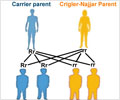Researchers at the Johns Hopkins University School of Medicine have identified a new genetic variant related to schizophrenia.
Researchers at the Johns Hopkins University School of Medicine have identified a new genetic variant related to schizophrenia.
They have found that a variation in the neuregulin 3 gene influences delusions associated with schizophrenia."Neuregulin 3 is clearly one more gene to add to the few currently known to contribute to schizophrenia," says David Valle, M.D., director of the McKusick-Nathans Institute of Genetic Medicine at Hopkins.
"There's much more to do, but we're making progress," he added.
During the study, the researchers separated the 73 different symptoms into nine distinct factors associated with the condition-prodromal, negative, delusion, affective, scholastic, adolescent sociability, disorganization, disability, hallucination.
In the genetic samples from more than 450 people with schizophrenia, team focused on one region of chromosome 10 that previously had been implicated to contain genes that contribute to the condition.
They analyzed more than 1,400 single nucleotide polymorphisms, or SNPs for short, to see if any particular SNPs were more frequently carried by schizophrenia patients than unaffected people.
Advertisement
Out of 20 most significant SNPs, 13 of them are located at or near this gene, but rather than being associated with delusion, the other SNPs are associated with scholastic, disorganization and hallucination factors.
Advertisement
"We're still at the stage of trying to understand the disease, figuring out what goes wrong in the brain," Avramopoulos added.
The team next plans to follow up and sequence the neuregulin 3 gene from a number of the patients in this study to look for rare genetic variants that might also contribute to the condition.
The study appears in American Journal of Human Genetics.
Source-ANI
SRM















